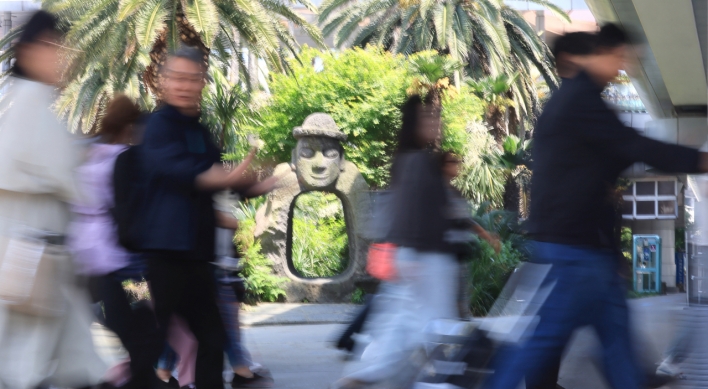Semester fees here equivalent to annual tuition plus living expenses in ChinaTotal
While Korean students struggle with rising college tuition fees and living costs, Chinese students are also feeling the strain.
A Chinese student surnamed Song has been working at a convenience store part-time for five months to earn her monthly rent and living expenses in Seoul.
Her day starts with studying Korean at one of the well-known universities in Seoul. From 2-7 p.m., she works as a cashier at a convenience store.
“I work here because I can earn money for living costs and practice Korean as well,” said Song.
She said the prices in Seoul are about three or four times as expensive as where she is from in China.
Chinese students are now easily spotted working at convenience stores in areas in central Seoul such as Myeongdong and Gwanghwamun. They also work at restaurants, mostly at Korean barbeque places, and bars where Korean students used to dominate as part-timers.
The government began to allow foreign students to work part-time in 2009 in a bid to help them lead a financially stable life.

Chinese students accounted for about 73 percent of the 93,232 foreign students here as of September, 2011, according to data from Korea Immigration Service.
Most of them are thought to be studying at their own expense, as about 87 percent of foreign students in Korea do so, according to the Education Ministry.
As the number of foreign students is likely to reach 100,000 this year, more Chinese students are also expected to seek part-time jobs to pay tuition fees and living expenses.
“It’s a heavy burden for us to pay college tuition in Korea. The fee per semester here equals about a yearly fee plus living costs in China,” said He Yun of Kyung Hee University.
“Although Chinese students studying in Korea are from families with a firm financial foundation, the prices in Korea are still burdensome for many,” said Chen Songzhe, a senior studying business at the same university.
Yun receives financial help from her parents, but also tries to earn money by teaching Chinese to Koreans.
Korean universities offer scholarships to foreign students, but not every foreign student can benefit from one.
“My school gives scholarships to about 70 to 80 students out of about 1,400 foreign students,” said He.
There are some schools offering scholarships amounting to as much as 30 to 50 percent of their tuition fee. Most of them are located in provincial areas, but there are a few in Seoul, according to Chinese student Tian Gian of Sungkyunkwan University.
“You can receive it unless you have a really bad GPA,” said Tian.
Some students try to be independent through any means they can find.
Xue Yong, who came to Korea in 2007, has worked a variety of part-time jobs, from deliveries to working at mom-and-pop chicken stores and bars. He brought a little more than 1 million won ($900) to Korea, and has never asked for his parents to send him money since then. Rather, he sent them money he earned here.
He first attended a Korean language institute to learn the language while working part-time, and later applied to study mass communication at Dongguk University.
“I work at Jaws Tteokbokgi now, a popular Korean snack eatery, from 5 p.m. to 12:30 a.m., and as I have a lot work experiences in Korea, now I can give advice to my boss who just opened her own business for the first time,” Xue said.
Xue said with confidence that he can afford his tuition fees and living expenses with his 1.5 million won monthly salary plus some savings.
Chen was also lucky enough to have won some competitive scholarships. He has also taught Chinese and interned at a medical appliances company to cover living expenses.
Chen plans to apply to a graduate school here to study Korean language education so that he can be a professional Korean teacher.
Song also dreams of becoming a professional Korean-Chinese interpreter in Korea although she confesses she’s not sure about her future.
“I’m stressed a lot lately by concerns about my future here in Korea. I would like to go to a graduate school of interpretation and translation at Hankuk University of Foreign Studies, but I find it hard to study and realize how hard it is. It’s kind of embarrassing to receive money from my parents although they are financially well-off,” said Song.
“I hope to become a professional interpreter some day.”
By Lee Woo-young (wylee@heraldcorp.com)
While Korean students struggle with rising college tuition fees and living costs, Chinese students are also feeling the strain.
A Chinese student surnamed Song has been working at a convenience store part-time for five months to earn her monthly rent and living expenses in Seoul.
Her day starts with studying Korean at one of the well-known universities in Seoul. From 2-7 p.m., she works as a cashier at a convenience store.
“I work here because I can earn money for living costs and practice Korean as well,” said Song.
She said the prices in Seoul are about three or four times as expensive as where she is from in China.
Chinese students are now easily spotted working at convenience stores in areas in central Seoul such as Myeongdong and Gwanghwamun. They also work at restaurants, mostly at Korean barbeque places, and bars where Korean students used to dominate as part-timers.
The government began to allow foreign students to work part-time in 2009 in a bid to help them lead a financially stable life.

Chinese students accounted for about 73 percent of the 93,232 foreign students here as of September, 2011, according to data from Korea Immigration Service.
Most of them are thought to be studying at their own expense, as about 87 percent of foreign students in Korea do so, according to the Education Ministry.
As the number of foreign students is likely to reach 100,000 this year, more Chinese students are also expected to seek part-time jobs to pay tuition fees and living expenses.
“It’s a heavy burden for us to pay college tuition in Korea. The fee per semester here equals about a yearly fee plus living costs in China,” said He Yun of Kyung Hee University.
“Although Chinese students studying in Korea are from families with a firm financial foundation, the prices in Korea are still burdensome for many,” said Chen Songzhe, a senior studying business at the same university.
Yun receives financial help from her parents, but also tries to earn money by teaching Chinese to Koreans.
Korean universities offer scholarships to foreign students, but not every foreign student can benefit from one.
“My school gives scholarships to about 70 to 80 students out of about 1,400 foreign students,” said He.
There are some schools offering scholarships amounting to as much as 30 to 50 percent of their tuition fee. Most of them are located in provincial areas, but there are a few in Seoul, according to Chinese student Tian Gian of Sungkyunkwan University.
“You can receive it unless you have a really bad GPA,” said Tian.
Some students try to be independent through any means they can find.
Xue Yong, who came to Korea in 2007, has worked a variety of part-time jobs, from deliveries to working at mom-and-pop chicken stores and bars. He brought a little more than 1 million won ($900) to Korea, and has never asked for his parents to send him money since then. Rather, he sent them money he earned here.
He first attended a Korean language institute to learn the language while working part-time, and later applied to study mass communication at Dongguk University.
“I work at Jaws Tteokbokgi now, a popular Korean snack eatery, from 5 p.m. to 12:30 a.m., and as I have a lot work experiences in Korea, now I can give advice to my boss who just opened her own business for the first time,” Xue said.
Xue said with confidence that he can afford his tuition fees and living expenses with his 1.5 million won monthly salary plus some savings.
Chen was also lucky enough to have won some competitive scholarships. He has also taught Chinese and interned at a medical appliances company to cover living expenses.
Chen plans to apply to a graduate school here to study Korean language education so that he can be a professional Korean teacher.
Song also dreams of becoming a professional Korean-Chinese interpreter in Korea although she confesses she’s not sure about her future.
“I’m stressed a lot lately by concerns about my future here in Korea. I would like to go to a graduate school of interpretation and translation at Hankuk University of Foreign Studies, but I find it hard to study and realize how hard it is. It’s kind of embarrassing to receive money from my parents although they are financially well-off,” said Song.
“I hope to become a professional interpreter some day.”
By Lee Woo-young (wylee@heraldcorp.com)
-
Articles by Korea Herald








![[Weekender] Korean psyche untangled: Musok](http://res.heraldm.com/phpwas/restmb_idxmake.php?idx=644&simg=/content/image/2024/05/02/20240502050841_0.jpg&u=)









![[Eye Interview] 'If you live to 100, you might as well be happy,' says 88-year-old bestselling essayist](http://res.heraldm.com/phpwas/restmb_idxmake.php?idx=652&simg=/content/image/2024/05/03/20240503050674_0.jpg&u=)
